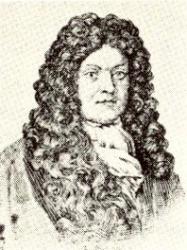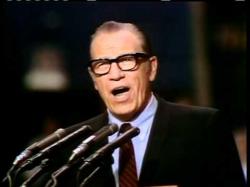Planning worship?
Check out our sister site, ZeteoSearch.org,
for 20+ additional resources related to your search.
- |
User Links
Person Results
Norman E. Johnson
1928 - 1983 Person Name: Norman Johnson, 1928-1983 Scripture: Matthew 16:24 Harmonizer of "ASSAM" in Lead Me, Guide Me (2nd ed.)
Norman E. Johnson
Ahasuer Fritsch

1629 - 1701 Person Name: Ahawuerus Fritsch Scripture: Matthew 16:24-28 Composer of "DARMSTADT" in Lift Up Your Hearts Born: December 16, 1629, Mücheln, Saxony.
Died: August 24, 1701, Rudolstadt, Germany.
With help from the family of a young noble he tutored, Fritsch received a good education, earning his law degree from the University of Jena in 1661. He later became chancellor of the university and president of the Consistory of Rudolstadt. He wrote on numerous subjects, including antiquities, law, and religion, and collected hymns.
Hymns--
"Liebster Immanuel, Herzog der Frommen"
"Dearest Immanuel, Prince of the Lowly"
Music--
WAS FRAG' ICH NACH DER WELT
--www.cyberhymnal.org/bio
Ahasuer Fritsch
A. Williams
1731 - 1776 Person Name: Aaron Williams Scripture: Matthew 16:17-19 Composer of "ST. THOMAS" in Lift Up Your Hearts Aaron Williams (b. London, England, 1731; d. London, 1776) was a singing teacher, music engraver, and clerk at the Scottish Church, London Wall. He published various church music collections, some intended for rural church choirs. Representative of his compilations are The Universal Psalmodist (1763)— published in the United States as The American Harmony (1769)—The Royal Harmony (1766), The New Universal Psalmodist (1770), and Psalmody in Miniature (1778). His Harmonia Coelestis (1775) included anthems by noted composers.
Bert Polman
A. Williams
Rhea F. Miller
1894 - 1966 Scripture: Matthew 16:26 Author of "I'd Rather Have Jesus" in Hymns of Faith Rhea F. Miller was the wife of Dr. H. V. Miller, one of the General Superintendents of the Church Of The Nazarene. After her husband's death Mrs. Miller taught piano and traveled all around the area in her little gray Nash coupe, teaching piano. She had a special mission in life and that was to get into pastors’ homes and teach their kids how to play the piano so they would have something to contribute to the church when they became adults. She would offer to teach these kids for free and hope to make up the difference with her other students. She was a very inspirational woman and made a deep impact upon many lives. She was very positive, always smiling, full of encouragement, and always enthusiastic.
Her father, Martin James Ross, such had been no more than a drunk for some time and would actually steal money from his wife’s purse, just to get enough money to buy another drink. Mrs. Ross was a good, solid, faithful Christian, though. And she just kept living her life for Jesus. She would walk to church in any kind of weather- rain, snow, sleet, mud, whatever it was, just to get there to be with God’s people. Eventually her steadfastness broke through the walls her husband had isolated himself with. He surrendered to the wooing of God’s Spirit and was wonderfully delivered from the awful bondage of sin. He stood one night in a service in Brooktondale and began his testimony of how much Jesus meant to him… “I’d rather have Jesus than all the gold or silver in the whole world. I’d rather have Him than anything this world has to offer.” Mrs. Miller sat there and heard the words of her father’s testimony and a new song was born- “I’d Rather Have Jesus”.
Bev Shea said he was 23 when he found the song in 1932. Mr. Shea didn’t copyright his version until 1939. Here he describes (from How Sweet the Sound) the impact that this song had on him: “One Sunday morning in the family home by the piano he discovered a poem with the title "I'd Rather Have Jesus." At the age of twenty-three, I was living at home with my parents, continuing to work at Mutual Life Insurance and studying voice. Going to the piano one Sunday morning, I found a poem waiting for me there. I recognized my mother's handwriting. She had copied the words of a poem by Mrs. Rhea F. Miller, knowing that I would read the beautiful message, which speaks of choice. As I read these precious words: "I'd rather have Jesus than men's applause. I'd rather be faithful to His dear cause." I found myself singing the words in a melody that expressed the feelings of my heart."
Mrs. Miller wrote some other songs, too. One was for a Missionary Convention, a little chorus based on Psalm 126:6. The words went like this: “He that goeth forth and weepeth, bearing precious seed, shall doubtless come again rejoicing, bringing in the sheaves”- then a repeat of that and close. She also wrote a song called "It Is Worth All It Costs To Be Holy", copyrighted June 15, 1937, Nazarene Publishing House. That was in our hymnals for a while.
Ron Kelly (former student and friend)
Rhea F. Miller
George Beverly Shea

1909 - 2013 Scripture: Matthew 16:26 Composer of "[I'd rather have Jesus than silver or gold]" in Hymns of Faith Long-time close associate of Billy Graham and soloist at Billy Graham's Crusades all over the world. He was largely responsible for the popularizing of "How Great Thou Art" and for moving the popularity of "Amazing Grace" from the cultural periphery into the mainstream of American Protestantism. He recorded dozens of albums and was eventually awarded a Grammy for Lifetime Achievement.
George Beverly Shea died on April 16, 2013, at the age of 104.
George Beverly Shea
Charles William Schaeffer
1813 - 1896 Person Name: Charles W. Schaeffer, d. 1896 Scripture: Matthew 16:24 Translator of "Come, Follow Me, the Savior Spake" in The Lutheran Hymnal
Charles William Schaeffer
Bartholomäus Gesius
1555 - 1613 Person Name: Bartholomäus Gesius, c. 1555-1613 Scripture: Matthew 16:24 Composer of "MACHS MIT MIR, GOTT" in Lutheran Service Book Bartholomaeus Gesius; b. 1555, Muencheberg, near Frankfort; d. 1613 or 14, Wittenberg
Evangelical Lutheran Hymnal, 1908
Bartholomäus Gesius
Johann Hermann Schein

1586 - 1630 Person Name: Johann Hermann Schein, 1586-1630 Scripture: Matthew 16:24 Arranger of "MACHS MIT MIR, GOTT" in Lutheran Service Book Schein, Johann Hermann, son of Hieronymus Schein, pastor at Griinhain, near Annaberg, in Saxony, was born at Grünhain, Jan. 20,1586. He matriculated at the University of Leipzig in 1607, and studied there for four years. Thereafter he acted for some time as a private tutor, including two years with a family at Weissenfels. On May 21, 1615, he was appointed Capellmeister, at the court of Duke Johann Ernst, of Sachse-Weimar; and in 1616 he became cantor of I3t. Thomas's Church, and music director at Leipzig, in succession to Seth Calvisius (d. Nov. 24, 1615). This post he held till his death, at Leipzig, Nov. 19, 1630.
Schein was one of the most distinguished musicians of his time, both as an original composer, and as a harmoniser of the works of others. As a hymnwriter he was not so prolific, or so noteworthy. Most of his hymns were written on the deaths of his children or friends, e.g. on seven of his children, and on his first wife. They appeared mostly in broadsheet form, and were included, along with his original melodies, in his Cantional oder Gesang-Buch Augspurgischer Confession, Leipzig, 1627; 2nd ed., 1645. [Both in Wernigerode Library.]
Those of Schein's hymns which have passed into English are:—
i. Machs mit mir, Gott, nach deiner Güt. For the Dying. First published, as a broadsheet, at Leipzig, 1628, as a Trost-Liedlein á 5 (i.e. for 5 voices), &c. [Berlin Library.] The words, the melody, and the five-part setting, are all by Schein. It was written for, and first used at, the funeral, on Dec. 15, 1628, of Margarita, wife of Caspar Werner, a builder and town councillor at Leipzig, and a churchwarden of St. Thomas's. It is in 6 stanzas of 6 lines; the initial letters of 11. 1, 3, in st. i.-iv., forming the name Margarita; and the W of st. v. 1. 1 standing for Werner. In Schein's Cantional, 1645, No. 303 (marked as Trost-Liedlein, Joh. Herm. Scheins, á 5), and later hymn-books, as e.g. the Unverfäschter Liedersegen, 1851, No. 830, st. vi. was omitted. It is Schein's finest production, and one of the best German hymns for the sick and dying. Translated as:—
Deal with me, God, in mercy now. This is a good and full translation by Miss Winkworth, in her Chorale Book for England, 1863, No. 191, set to Schein's melody of 1628.
ii. Mein Gott und Herr, ach sei nicht fern. For the Dying. First published, with his name, in his Cantional, 1627, No. 262, in 9 stanzas of 6 lines. The initial letters of the stanzas give the name Margarita, probably one of the daughters who predeceased him. It is included, in 5 st., in the 164-8, and later eds., of Crüger's Praxis. The translation in common use is:—
My Lord and God, go not away. A good tr. of st. i., ii., iv., v., vii., by A. T. Russell, as No. 254, in his Psalms & Hymns, 1851. [Rev. James Mearns, M.A.]
--Excerpts from John Julian, Dictionary of Hymnology (1907)
Johann Hermann Schein
John Ireland

1879 - 1962 Person Name: John Ireland, 1879-1962 Scripture: Matthew 16:15-18 Composer of "LOVE UNKNOWN" in Common Praise John Ireland (1879-1962) studied at Durham University in England and became a church organist, choirmaster, editor, and lecturer, eventually teaching at the Royal College of Church Music. He was a gifted composer of music for voice, piano, organ, chamber music, and orchestra that were recognized for their excellence during his lifetime; LOVE UNKNOWN was his only hymn tune, found today in numerous hymnals.
Emily Brink
John Ireland
Marty Haugen
b. 1950 Person Name: Marty Haugen (b. 1950) Scripture: Matthew 16:24 Author of "Tree of Life and awesome mystery" in Church Hymnary (4th ed.) Marty Haugen (b. 1950), is a prolific liturgical composer with many songs included in hymnals across the liturgical spectrum of North American hymnals and beyond, with many songs translated into different languages. He was raised in the American Lutheran Church, received a BA in psychology from Luther College, yet found his first position as a church musician in a Roman Catholic parish at a time when the Roman Catholic Church was undergoing profound liturgical and musical changes after Vatican II. Finding a vocation in that parish to provide accessible songs for worship, he continued to compose and to study, receiving an MA in pastoral studies at the University of St. Thomas in St. Paul Minnesota. A number of liturgical settings were prepared for the Evangelical Lutheran Church in America and more than 400 of his compositions are available from several publishers, especially GIA Publications, who also produced some 30 recordings of his songs. He is composer-in-residence at Mayflower Community Congregational Church in Minneapolis and continues to compose and travel to speak and teach at worship events around the world.
Emily Brink
Marty Haugen


 My Starred Hymns
My Starred Hymns


